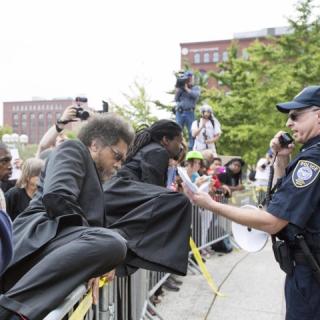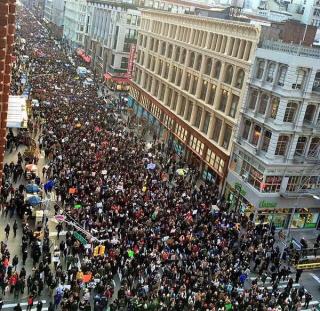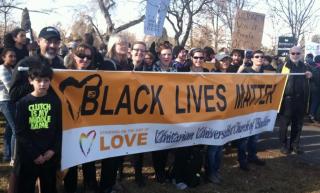Spiritual Practices For White Discomfort
So, lots of folks in the progressive world I inhabit on social media had a lot of opinions about the event that happened on August 8th in Seattle when the white leftie politician Bernie Sanders went to speak to a crowd about social security and medicare and was interrupted by two black women raising awareness about the Black Lives Matter movement the day before the first anniversary of Mike Brown’s death.
And sure, as a white progressive who is pretty into Bernie Sanders' political stances and who staunchly supports the Black Lives Matter movement, I have opinions too.
The opinion I wish to share here and now, however, is not about political analysis, history or strategy and it’s certainly not about the particular incident in Seattle. It is about spiritual practices. It’s about how as a person of faith, a Unitarian Universalist minister, and a middle class educated white woman who cares deeply about racial justice, I use spiritual practices to sit with my white discomfort.
What do I mean by white discomfort? I mean a social trend that I see repeatedly and an emotional reaction I’ve observed in myself. It goes something like this: The media breaks a story about something that Black Lives Matter activists did. Maybe somebody burned a building or blocked a freeway or shouted during a leisure event or interrupted a politician. White people react to such stories in a variety of ways. There’s everything from vocal and undaunted support to blatantly racist rants.
I want to focus on those of us who fall somewhere in the middle of that reaction spectrum. I want to focus on those of us who feel confusion about why these tactics were chosen, who feel concerned that the tactics might be alienating or “going too far,” who feel afraid for how others further down the spectrum will react, who feel angry about being made to feel uncomfortable.
The spiritual practices I suggest here are designed for us: the white liberals in the middle of the reaction spectrum. And while I'm a devout Unitarian Universalist, these practices can be done by someone of any or no faith. These are practices that decenter our egos and help us to learn and grow while being compassionate with ourselves and faithful to our values.
I share these practices because I hope they can help us next time there's a Black Lives Matter action that unsettles white folks. And it will happen again. This powerful movement for racial justice is not slowing down and it is not playing respectability politics (amen and hallelujah!)
So here’s what we can do next time:
Sit with discomfort This is such a valuable exercise for both personal spiritual development and for combating our own white fragility. For those who practice mindfulness or draw on Buddhist traditions, sitting with discomfort may be familiar. For others of us it may not. Either way, learning to name and own our own discomfort it is crucial to our spiritual development and our ability to be allies. When judgment comes up, try turning to curiosity This spiritual practice is good for all kinds of conflict and negative reactions. When I’m feeling judgment toward myself or others, I try to re-frame with curiosity. From “that was so stupid and ineffective” to “I wonder why those activists chose that strategy?” From “I’m a bad white ally for having these thoughts” to “I wonder where my discomfort is coming from and what I can learn about myself ?”
Read up There are so many resources online! This is the time to seek out perspectives that support whatever action is making us uncomfortable. Look for the article that will explain the social context behind burning that building, the legacy of direct action that prompted blocking that freeway, the social commentary achieved by disrupting white leisure spaces, or why even progressive candidates need to be pushed. Reading these perspectives can be really helpful and can sometimes be hard. This is a good time to remember that the Unitarian Universalist fourth principle calls us toward such exploration. Accepting the discomfort and turning to curiosity remain important.
Process feelings with other committed allies privately Ours is a relational and covenantal faith and we need one another to be our best selves. I usually talk to my partner or my best friend, both of whom are white people who care a lot about racial justice and are people I trust. If you don’t have such folks in your life already, reach out to someone you know to be a committed white ally! They will likely be glad to have a processing partner or help you find one.
Stay focused on the big picture The movement for racial justice is so much bigger than one action. Usually once I’ve sat with my discomfort, gotten curious, read up and processed I’m in a place where I understand whatever action made me uncomfortable and am ready to help others process it. But even if I’m still feeling squicky about it, I can support the Black Lives Matter movement and I can work for racial justice. I can give money or show up to local rallies, or find helpful lists of ways to be involved and do some of them. Holding ambiguity and acting on our values even while uncomfortable are also spiritual practices. This is how we strengthen our religious muscles and build our own faithful capacity.
And when we find ourselves wanting to...
...go public with our discomfort Then it's time to practice deep listening and keep quiet. This practice is also a good one for everything from small group ministry to conversations with a loved one, no matter what the topic is. While processing our feelings privately with other allies is important to helping us stay engaged, using spaces like Facebook, twitter, email list-serves or a congregational meeting for our own processing isn't helpful. The movement needs to stay focused on black lives. It saps the energy of those working hard to organize and advocate for racial justice to read or hear and then respond to public expressions of white discomfort, and is especially draining for people of color.
... determine what tactics are appropriate Then it's time to practice radical faith. Maybe you’ve processed the Bernie Sanders Seattle debacle but you still wonder “what if Black Lives Matter activists do something else that I disagree with more? Where do I draw the line?” First of all, we are not running this movement. The only line we need to draw is for our own personal involvement. Fortunately even if you are not personally comfortable with confrontation or disruptive action, you can still be an ally and do whatever you are comfortable with. You can also practice faith. By faith I mean sacred trust. It is hard for white liberals to put our sacred trust in radical black activists because we are socially conditioned not to do that. But it is perhaps the most important spiritual practice on this list; it is liberating soul saving work to practice this type of faith.
~
Let us practice radical faith and deep discernment. Let us sit with our discomfort, turn to curiosity, educate ourselves, be vulnerable in our relationships and act on our religious values. These spiritual practices will serve us well in every aspect of our lives. They will serve us well in every movement where we are working to be allies. And they will allow us to stay engaged with the Black Lives Matter movement, this powerful and multifaceted cry that our nation cease the deeply immoral practices of white supremacy and turn to a new way. We Unitarian Universalists know that we must turn to a new way. We know we must be part of the turning. And we have the spiritual resources to do our part. So let’s keep working.


